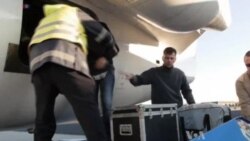International efforts to remove and destroy Syria's chemical weapons are hitting more roadblocks. December 31 for the most deadly chemicals to ship out of the country is fast approaching but many of those toxins have not yet been transported.
Norwegian ships off the coast of Cyprus waiting for the call to head to Syria to pick up some of the world's most dangerous cargo, chemical weapons, like those blamed for the deadly attack on civilians in August.
But the ongoing fighting has made getting the toxins to the port of Latakia difficult. Sigrid Kaag is with the Organization for the Prohibition of Chemical Weapons:
"Security, I think all parties agree, that this is of course a big concern, always, but it also impacts the safety of any convoy and the safety of any effort," said Kaag.
The OPCW has been warning for days that transport of the most critical chemicals before December 31 is unlikely.
For now, the delay is not raising concern in Washington, which characterized the deadline as ambitious. State Department spokeswoman Marie Harf:
"As long as we see foward progress that's what's most importnant here, and we have," said Harf.
The agreement with Syrian President Bashar al-Assad does not call for eliminating all chemical weapons until the end of June. Yet some experts worry the longer it takes to eliminate Syria's arsenal, the greater the danger.
Andrew Tabler is at the Washington Institute.
"President Assad knows very well that his usefulness to the international community rapidly drops off as soon as he gives up those chemical weapons. I think he has an interest in dragging this out," said Tabler.
Just one more worry as the international community tries to end the bloodshed and, eventually, to rid Syria of chemical weapons.
Norwegian ships off the coast of Cyprus waiting for the call to head to Syria to pick up some of the world's most dangerous cargo, chemical weapons, like those blamed for the deadly attack on civilians in August.
But the ongoing fighting has made getting the toxins to the port of Latakia difficult. Sigrid Kaag is with the Organization for the Prohibition of Chemical Weapons:
"Security, I think all parties agree, that this is of course a big concern, always, but it also impacts the safety of any convoy and the safety of any effort," said Kaag.
The OPCW has been warning for days that transport of the most critical chemicals before December 31 is unlikely.
For now, the delay is not raising concern in Washington, which characterized the deadline as ambitious. State Department spokeswoman Marie Harf:
"As long as we see foward progress that's what's most importnant here, and we have," said Harf.
The agreement with Syrian President Bashar al-Assad does not call for eliminating all chemical weapons until the end of June. Yet some experts worry the longer it takes to eliminate Syria's arsenal, the greater the danger.
Andrew Tabler is at the Washington Institute.
"President Assad knows very well that his usefulness to the international community rapidly drops off as soon as he gives up those chemical weapons. I think he has an interest in dragging this out," said Tabler.
Just one more worry as the international community tries to end the bloodshed and, eventually, to rid Syria of chemical weapons.









